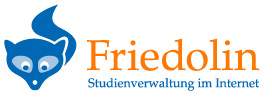| Name des Moduls | [350310] Light-Matter Interactions and Optical Materials Design | Bezeichnung des Moduls | MMC W011 |
| Studiengang | [733] - Chemistry of Materials | ECTS Punkte | 5 |
| Arbeitsaufwand für Selbststudium | 90 | Häufigkeit des Angebotes (Modulturnus) | jedes Semester |
| Arbeitsaufwand in Präsenzstunden | 60 | Dauer des Moduls | 1 |
| Arbeitsaufwand Summe (Workload) | 150 | ||
| Modul-Verantwortliche/r | Prof. Dr-Ing. Lothar Wondraczek |
| Voraussetzung für die Vergabe von Leistungspunkten (Prüfungsform) | Written or oral exam covering the content dealt with in the lectures and seminar (100%) |
| Zusätzliche Informationen zum Modul | none |
| Empfohlene Literatur | Will be recommended at the beginning of the module. |
| Unterrichtssprache | English |
| Voraussetzung für die Zulassung zum Modul | 733 MSc Chemistry of Materials: none |
| Empfohlene bzw. erwartete Vorkenntnisse | 733 MSc Chemistry of Materials: fundamental physics |
| Verwendbarkeit (Voraussetzung wofür) | 733 MSc Chemistry of Materials: none |
| Art des Moduls (Pflicht-, Wahlpflicht- oder Wahlmodul) | 733 MSc Chemistry of Materials: Elective module as „individual specialization“ |
| Zusammensetzung des Moduls / Lehrformen (V, Ü, S, Praktikum, …) | Lecture (2 SWS), seminar (2 SWS) |
| Inhalte | Theoretical background of light-mater interactions, distinguish between conductors, semi-conductors, and dielectric media; atomic polarization, optical refraction, and optical dispersion; length-scale dependence of light-matter interactions considering nanomaterials, plasmon interaction in particles, and thin layers; photonic band-gap; focus on inelastic light scattering at high and low frequencies; luminescence and phosphorescence; tailoring of optical properties through chemical bonds, material topology, dopants, and dopant interactions. |
| Lern- und Qualifikationsziele | Students understand fundamental aspects of light-matter interaction, distinguish between electrical and magnetic field interactions, understand prominent resulting phenomena, and their tailoring through materials chemistry with a particular focus on inorganic materials. |
| Voraussetzung für die Zulassung zur Modulprüfung | none |


